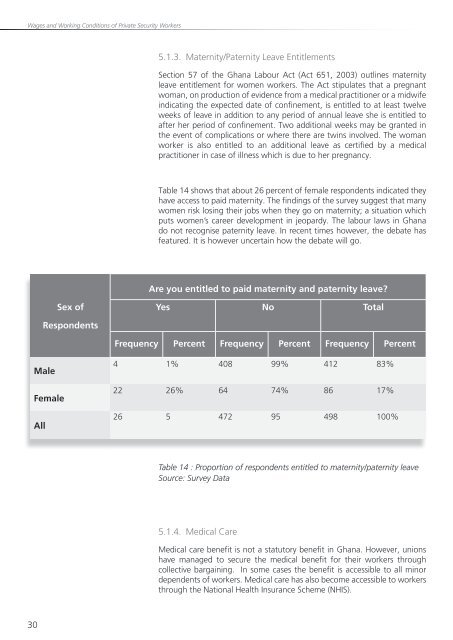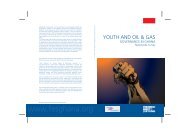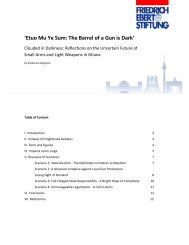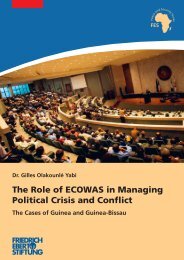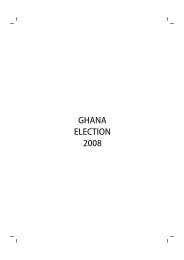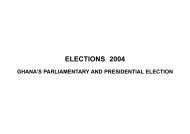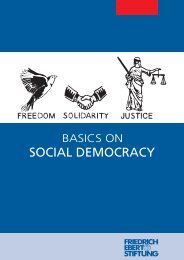Wages and Working Conditions of Private Security Workers in Ghana
Wages and Working Conditions of Private Security Workers in Ghana
Wages and Working Conditions of Private Security Workers in Ghana
Create successful ePaper yourself
Turn your PDF publications into a flip-book with our unique Google optimized e-Paper software.
<strong>Wages</strong> <strong>and</strong> <strong>Work<strong>in</strong>g</strong> <strong>Conditions</strong> <strong>of</strong> <strong>Private</strong> <strong>Security</strong> <strong>Workers</strong><br />
5.1.3. Maternity/Paternity Leave Entitlements<br />
Section 57 <strong>of</strong> the <strong>Ghana</strong> Labour Act (Act 651, 2003) outl<strong>in</strong>es maternity<br />
leave entitlement for women workers. The Act stipulates that a pregnant<br />
woman, on production <strong>of</strong> evidence from a medical practitioner or a midwife<br />
<strong>in</strong>dicat<strong>in</strong>g the expected date <strong>of</strong> conf<strong>in</strong>ement, is entitled to at least twelve<br />
weeks <strong>of</strong> leave <strong>in</strong> addition to any period <strong>of</strong> annual leave she is entitled to<br />
after her period <strong>of</strong> conf<strong>in</strong>ement. Two additional weeks may be granted <strong>in</strong><br />
the event <strong>of</strong> complications or where there are tw<strong>in</strong>s <strong>in</strong>volved. The woman<br />
worker is also entitled to an additional leave as certified by a medical<br />
practitioner <strong>in</strong> case <strong>of</strong> illness which is due to her pregnancy.<br />
Table 14 shows that about 26 percent <strong>of</strong> female respondents <strong>in</strong>dicated they<br />
have access to paid maternity. The f<strong>in</strong>d<strong>in</strong>gs <strong>of</strong> the survey suggest that many<br />
women risk los<strong>in</strong>g their jobs when they go on maternity; a situation which<br />
puts women’s career development <strong>in</strong> jeopardy. The labour laws <strong>in</strong> <strong>Ghana</strong><br />
do not recognise paternity leave. In recent times however, the debate has<br />
featured. It is however uncerta<strong>in</strong> how the debate will go.<br />
Are you entitled to paid maternity <strong>and</strong> paternity leave?<br />
Sex <strong>of</strong><br />
Yes No Total<br />
Respondents<br />
Frequency Percent Frequency Percent Frequency Percent<br />
Male<br />
Female<br />
All<br />
4 1% 408 99% 412 83%<br />
22 26% 64 74% 86 17%<br />
26 5 472 95 498 100%<br />
Table 14 : Proportion <strong>of</strong> respondents entitled to maternity/paternity leave<br />
Source: Survey Data<br />
5.1.4. Medical Care<br />
Medical care benefit is not a statutory benefit <strong>in</strong> <strong>Ghana</strong>. However, unions<br />
have managed to secure the medical benefit for their workers through<br />
collective barga<strong>in</strong><strong>in</strong>g. In some cases the benefit is accessible to all m<strong>in</strong>or<br />
dependents <strong>of</strong> workers. Medical care has also become accessible to workers<br />
through the National Health Insurance Scheme (NHIS).<br />
30


